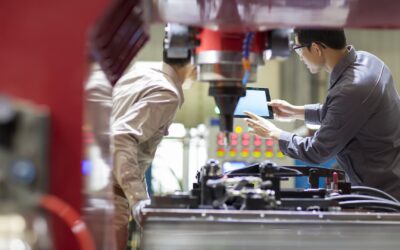Anyone can come up with an idea for a product to manufacture. But few possess the technical know-how and equipment to make it a reality. Enter Manufacturing as a Service (MaaS) —This new concept is lowering barriers for businesses of all sizes, enabling them to outsource production tasks and focus on what they do best.
This article will review the concept of MaaS, how it works, and what it looks like in practice.
A Definition of Manufacturing as a Service
Manufacturing as a Service (MaaS) is an emerging concept that enables companies to outsource their manufacturing needs to third parties. Like other types of ‘as-a-Service’ models, it’s structured so that companies pay for what they need when they need it. This is particularly valuable when you don’t have enough resources to produce something in-house or are looking to scale up quickly.
In turn, MaaS streamlines the manufacturing process, making it simpler for companies to access resources such as facilities, technology, and personnel on an ‘as needed’ basis.
Why Does MaaS Matter?
MaaS is a welcome concept in today’s rapidly evolving world, where sustainability concerns and digitization have dramatically changed the business landscape. Organizations are expected to minimize their footprint in everything they do, from material sourcing to production processes to building design. Scaling with efficiency in this way isn’t just responsible, but also a necessary element of remaining competitive amidst increasing globalization.
MaaS combines lean production techniques with digital solutions for smart and sustainable operations. It’s made possible by the rapid technological advancements we’ve seen over the past decades and especially the past few years. This is collectively known as Industry 4.0, representing humanity’s next big leap forward in innovation.
What Manufacturing as a Service Looks Like In Action
The idea behind MaaS is to create a flexible, cost-effective production system that fits the needs of an organization. A MaaS provider will not only deliver customized solutions for specific projects and processes but also provide ongoing support through access to resources such as analytics, software systems, and other technologies.
Again, new innovations make coordinating large-scale arrangements to such an extent much easier: Modern facilities are equipped with advanced Internet of Things (IoT) systems that streamline data-driven production and supply chain management. Hooked up by these IoT systems are AI and machine learning to help optimize the entire process by improving resource allocation and detecting potential issues before they become problems. Moreover, cloud services allow for secure storage of data while also providing companies with a platform to share information and collaborate on projects.
The Numerous Benefits That Manufacturing as a Service Has to Offer
Manufacturing as a Service may come off as a futuristic, hyped-up concept to some. Massive networks of connected machines exchanging information and producing goods in real-time? That sounds like something out of a sci-fi movie, but it’s something entirely possible today.
MaaS technology has already been implemented by numerous tech companies and manufacturers in various industries around the world. Its increased use has spurred investment to develop the technology further. Plus, with so many benefits to reference, it’s hard to see how any small company looking to create tangible IP without a large overhead cost could be on the fence. Here’s a look at the top five advantages offered by Manufacturing as a Service:
1. Controlled Costs
When it comes to the subject of business longevity, the math is simple: fewer overhead costs equal more stability. By leveraging MaaS, companies are able to dramatically reduce their financial obligations. Instead of having to continually invest in machinery and personnel for production purposes, companies can simply outsource projects as needed and only pay when necessary.
2. Increased Access to Technology
While every production facility could benefit from having the latest and greatest technologies, most companies don’t have the capital to acquire them. With MaaS, businesses can take advantage of advanced technologies without having to make huge investments.
3. Enhanced Innovation and Competitiveness
Continuing on the last point; when more creators have access to cutting-edge tools, their collective chance of breaking barriers increases. Connecting organizations big and small through MaaS opens the door to an unprecedented level of collaboration and innovation. Not only that, but having access to “on-demand” services shortens time-to-market and bolsters customization capabilities. These are both major boons for businesses looking to stay competitive.
4. Reduced Risk and Unrivaled Flexibility
When outsourcing projects through MaaS, companies don’t have to worry about the risks associated with expanding a business. There are no long-term investments or commitments; instead, services can be used as needed, allowing for more flexible and controlled scaling. This level of risk reduction is especially helpful in uncertain economic times or when organizations are launching into new markets.
5. Lessened Labor Strain
It’s common knowledge that the manufacturing industry is experiencing a major talent drought. Companies are having a hard time finding and retaining qualified workers to fill their many open roles, while those who are new to the sector will require years of training to get up to speed. For smaller-scale operations, this reality can be especially challenging. Through MaaS, companies can get the work done by experienced personnel without having to worry about coordinating things in-house.
Ultimately, Manufacturing as a Service provides companies with an affordable way to access the technologies, tools, and resources they need to succeed for a fraction of the cost. From reduced overhead to improved scalability and lessened labor strain, there are many reasons why businesses should consider MaaS for their operations. Every situation is different, but for companies that are looking to stay competitive in a rapidly changing market, MaaS can be an invaluable asset.
Sign up today for a free Essential Membership to Automation Alley to keep your finger on the pulse of digital transformation in Michigan and beyond.
Automation Alley is a World Economic Forum Advanced Manufacturing Hub (AMHUB) for North America and a nonprofit Industry 4.0 knowledge center with a global outlook and a regional focus. We facilitate public-private partnerships by connecting industry, education and government to fuel Michigan's economy.




